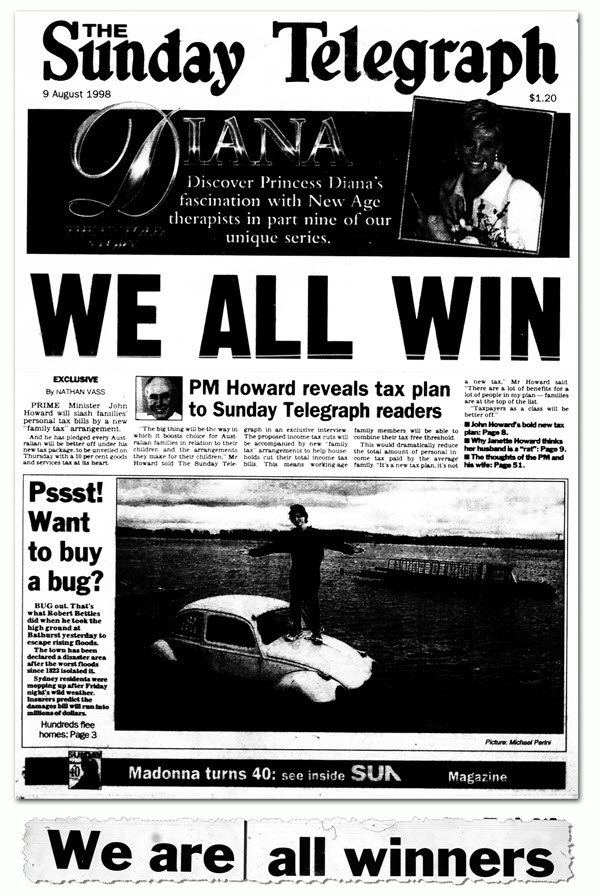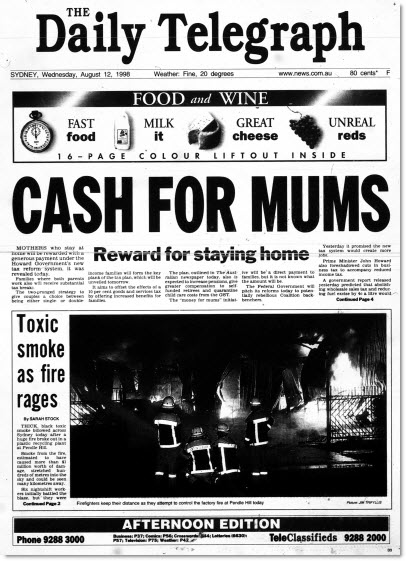This week, in the latest salvo in The Daily Telegraph‘s war with the Gillard government, baby-faced editor Paul Whittaker decided to lay down a challenge to the office of communications minister Stephen Conroy.
Conroy had got the Tele‘s goat by suggesting on ABC radio that the paper was running a deliberate regime change campaign via the trojan horse of the carbon tax.
“The Daily Telegraph is interested in distorting the debate, demanding an election campaign, purely intended to try and get rid of the government,” Conroy thundered, adding that “if you’re a Labor voter reading The Daily Telegraph, you should keep reading it for the footy coverage but you shouldn’t take seriously any of its front-page headlines.”
In the wake of Carbon Sunday, the Tele had, of course, gone to war against Gillard, with three front page hatchets in a row.

Whittaker (or an underling) dived straight for the keyboard, accusing the Senator in a swingeing editorial of the “glassiest of political jaws…during a bizarre and intellectually confused assault on The Daily Telegraph.”
“The Daily Telegraph is simply doing what it has always done, and done well — holding the government of the day to account.” It suggested Conroy “should examine our archives for previous instances of this stance, which ranges across all political parties.”
Crikey decided to take Whittaker up on the challenge, spending five hours yesterday in the State Library of Victoria’s microfiche archives to find hard historical evidence of the Tele‘s fair and balanced approach.
One example of the Tele‘s even handedness, Whittaker reckoned, was a front page from 2000 directly prior to the GST’s introduction, which had the headline “Tax dread.” Unfortunately, the current period of debate on the carbon tax is hardly analogous. We would have to wait until late June next year — just prior to the tax’s commencement– to make a proper comparison.
The correlating period in the Tele‘s treatment of John Howard’s GST is actually the days around its launch on August 14, 1998 when Col Allen was editor. At that point, the government was desperate for a mandate for Peter Costello’s baby, having specifically ruled it out in the lead-up to the 1996 poll.
A year before the policy launch, in August 1997, the Tele was already laying the groundwork, claiming the GST was now an “urgent reform” following the High Court’s decision that year to ban on state liquor and cigarette taxes. The tax would create “big winners“, despite some “battlers” being worse off, said business scribe Keith Gosman. On August 14, a triumphant Tele dragged out a strapline “Tax Reform At Last“.
Over the next 12 months, the paper would return to the “winners” theme again and again.
Skip to August 4 1998 — just ten days before the nation would be lavished with the details of its new consumption charge. An election was imminent. The Tele, perhaps sniffing the ill wind of popular dissent, pulled out all stops, led by crusading economics reporter David Luff (who would later be employed as John Howard’s press secretary).
Luff was keen to tell readers about his future boss’ “plan to ease household burden” alongside a helpful breakout box detailing “how families will reap benefits”.
The next day, according to Luff, “shopkeepers” were “ringing up support for the GST” and a few days later, according to motoring writer Michael Taylor, the car industry was joining them in the rapture. Luff was back on August 8, informing New South Wales that, according to Howard, “families” would be the big GST winners. During that week, Crikey couldn’t find a single negative yarn about the tax (a few equivocated).
But this was nothing compared to The Sunday Tele‘s front page on August 9 — and an accompanying double page inside spread.

The next day, intrepid Tele reporter Miranda Devine had an excellent scoop, scoring one of those exclusive tete a tetes aboard the PM’s private jet. It was, said the Tele, a “portrait of a man on a mission”.

By midweek, the paper was reporting glowingly that Peter Costello was about to hand out “Cash for mums.”

The denouement though, would come on the Friday following the media lock-up on the Thursday afternoon. How would the Tele frame it, Australia’s most populous state begged to know? Luckily two fat lobsters were on their way to battlers everywhere.

Among the 22 GST stories on that day, just two — a comment piece by Terry McCrann and a story on the cost of living — were mostly negative, with the rest of the extraordinary edition reading like the puffiest of puffs (read the full 14 August whitewash here).
Despite Col Allan’s efforts, it seems the public could see right through the deception. A poll published in the Sydney Morning Herald on October 2 1998 — the day before the election — showed 55% opposed to a GST, with 38% in favour. That number hadn’t moved much since the package’s launch. The Sunday Tele reluctantly reported its own poll numbers confirming the rancour on the Sunday under the headline “Thumbs Down“.
According to one well-placed 1990s Telegraph insider, Allan — who would soon be promoted to editor-in-chief of the 7-day operation — was jubilant after the election, bragging that it was his front page on the morning of the poll that saved Howard.
Stephen Conroy was scathing when contacted by Crikey this morning:
“Editor Paul Whittaker on Tuesday invited an examination of The Daily Telegraph’s archives to prove the paper’s claims of being unbiased — and then went on “prove” his point by using a highly selective example of the paper’s coverage of the introduction of the GST. One can only suspect he is today completely horrified to find that a journalist has actually taken up the challenge and exposed his falsehood.”
“…And Mr Whittaker’s claim that The Daily Telegraph’s coverage of the Carbon Tax merely reflects public opinion has also been exposed as highly dubious. If it were a credible reason, why would The Daily Telegraph not have condemned the GST in 1999 when an AC Nielsen poll in May of that year showed 58% of Australians opposed it?”
“Instead, it acted — as it is now with the Carbon Tax — in a biased way in favour of the Coalition.
“So when Mr Whittaker says ‘no observer could claim (The Daily Telegraph) was timid or deferential to the then-Coalition government’ in relation to the GST, he is correct. ‘Completely glowing and biased in favour of’ would be far more accurate.”
Paul Whittaker said he “stood by” the editorial this morning.
“Not sure what archives you’ve looked at, but in the lead-up to the introduction of the GST once the details of it were formulated, we ran numerous stories questioning its impact on families,” Whittaker said, citing the 2000 “Tax dread” splash and another one headlined “Give & Take, Rise in childcare fee devours GST rebate’’.
“I could send you many more examples with more time,” he added.








A nice piece of work.
While it wasn’t coming from an incumbent government in that instance, it’d nonetheless be interesting to also compare the coverage of Hewson’ Fightback proposal, which had a GST as its centrepiece.
I declare an epic win for Crikey.
Surely this sort of actual investigative work is what journalism is actually supposed to be about, rather than biased, partisan bullsh-t that the Tele has now been proven to run?
Bravo.
You would have thought he (Whittaker) would have access to all the archives of his papers. Unless Lulz deleted them. 🙂
At any rate, running a headline like this, with the knowledge that there’s contradictory material in his archives sounds like someone living in a glasshouse throwing stones.
@Mark: And a coverage of Keating’s GST proposal, when he supported it.
Attention:- Paul Whittaker
Get yourself a troika – easy as – all you need do is add that pommy gem Lord Mockingbird to the dynamic duo of Lord Bolt and Lord Akerman.
Remember all those to the left of the great center-right need to be dealt with. Get on with it.
Yours in negativity.